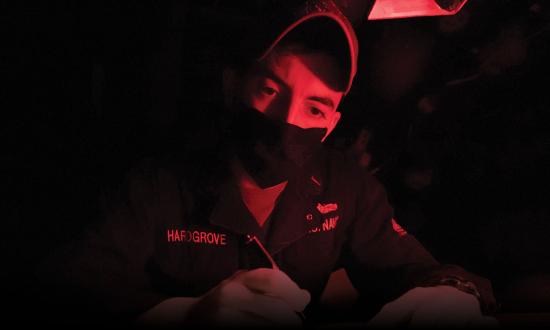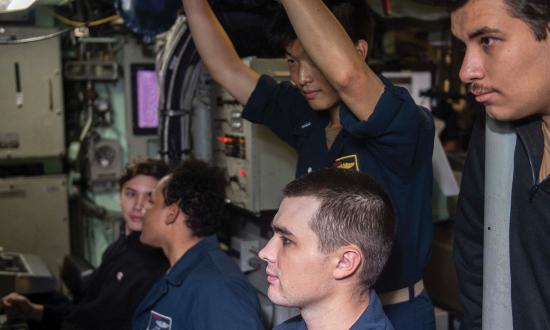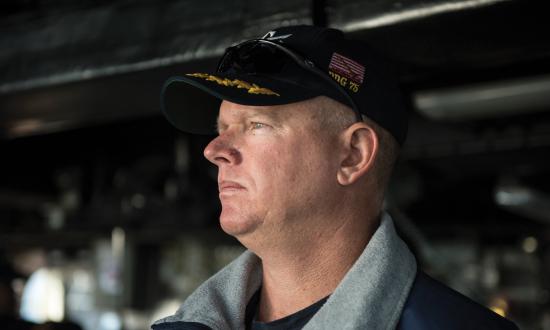In the early hours of 17 June 2017, the USS Fitzgerald (DDG-62) collided with the MV ACX Crystal. Just two months later, at 0524 on 21 August, the USS John S. McCain (DDG-56) and a 30,000-ton oil tanker collided off the coast of Singapore and Malaysia. Sleep inertia was purported to be an influencing factor in both accidents.
Sleep inertia refers to the transition period between sleep and wakefulness. When the human brain switches from sleep to waking, it experiences some level of “sleep drunkenness.”1 This is characterized by mental confusion, reduced alertness, cognitive impairment, and degraded decision-making and can last from several minutes to more than an hour, with impairments appearing most severe immediately on waking.2 Sleep inertia is of particular concern in military operations, where unanticipated events require personnel to awaken unexpectedly and immediately undertake critical decision-making and actions.
Sleep inertia can have negative impacts on performance regardless of how long one has been asleep. Abrupt awakening from deep sleep, however, has been found to produce more sleep inertia.3 Moreover, the greater the sleep debt, the greater the cognitive performance deficit.4 This is especially worrying in light of research that found sailors’ rapidly rotating work schedules expose them to disrupted circadian rhythms and sleep deprivation.5
While some components of cognition may be more affected by sleep inertia than others, real-world operational tasks often involve a combination of cognitive tasks. For example, operating a vessel safely requires situational awareness, information processing, decision-making, and, in some instances, rapid response. A 2011 study found sleep inertia negatively affected performance in a simulated enemy attack among a group of healthy, highly motivated junior officer reservists who were awoken unexpectedly.6 A retrospective analysis of more than 400 Air Force accidents found accidents associated with pilot error most commonly occurred during the first hour after waking, suggesting sleep inertia could be a contributing factor.7
Sleep inertia can be addressed using “proactive strategies” (measures implemented before or during sleep, such as sleep timing and length) or “reactive strategies” (measures implemented after waking, such as caffeine or exposure to bright light). Research into proactive strategies can inform guidelines on rest breaks and shift scheduling. Studies have shown that sailors working a circadian schedule had 30 percent faster responses and 40 to 50 percent fewer errors than when working the traditional 5/10 schedules. In 2018, Naval Surface Forces Commander Vice Admiral Thomas Rowden directed all surface ships to implement watch schedules and shipboard routines more in line with crew members’ natural circadian rhythms and sleep cycles, but more efforts are need to ensure practices continue to improve.
Proactive strategies require an adequate sleep opportunity, with a designated bedtime and waking time. Because this might not always be feasible in the Navy, countermeasures that can be implemented on awakening are needed.
Various reactive countermeasures have been studied, including exposure to cold, physical activity, smell, and light; however, findings often are inconclusive, and their utility in a military environment is questionable.8 Caffeine can be an operationally viable, field-deployable countermeasure, but even in a rapidly absorbing chewing gum, its effects are delayed for about 30 minutes. Moreover, its relatively long-lasting stimulating effects may not be warranted among personnel needing to return to sleep within a few hours. The Crew Endurance Team at the Naval Postgraduate School is exploring the use of bright light and activating odorants, which might help sailors awaken more rapidly and assist with critical decision-making.
Because sleep inertia is a perilous period that can result in operational incidents, identifying effective countermeasures is a critical next step in promoting safe naval operations.
1. Lynn M. Trotti, “Waking Up Is the Hardest Thing I Do All Day: Sleep Inertia and Sleep Drunkenness,” Sleep Medicine Reviews 35 (October 2017): 76–84.
2. Jim Horne and Robert Moseley, “Sudden Early-Morning Awakening Impairs Immediate Tactical Planning in a Changing ‘Emergency’ Scenario,’” Journal of Sleep Research 20 (June 2011): 275–80.
3. Patricia Tassi and Alain Muzet, “Sleep Inertia,” Sleep Medicine Reviews 4 (August 2000): 341–53.
4. Horne and Moseley, “Sudden Early-Morning Awakening Impairs Immediate Tactical Planning.’”
5. Nita Lewis Shattuck and Pantagiotis Matsangas, “The Effect of Sleep on Mood of U.S. Navy Sailors,” Sleep 41 (April 2018).
6. Horne and Moseley, “Sudden Early-Morning Awakening Impairs Immediate Tactical Planning.”
7. J. Ribak et al., “Diurnal Rhythmicity and Air Force Flight Accidents Due to Pilot Error,” Aviation, Space, and Environmental Medicine 54 (December 1983): 1,096–99.
8. Cassie Hilditch et al., “Time to Wake Up: Reactive Countermeasures to Sleep Inertia,” Industrial Health 54 (November 2016): 528–41.







